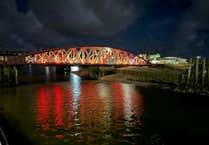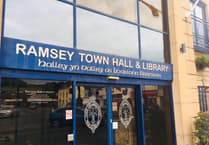When I was studying journalism for a postgraduate degree at Glasgow Caledonian University, I did one week’s work experience at Isle of Man Newspapers in 2014. During that week, Adrian Darbyshire was there as chief reporter, a role he will relinquish when he moves at the end of this month to the Shetland Islands.
Adrian was friendly and approachable, with shorthand as his second language. I was trying to learn shorthand at the time during my studies and was blown away with how speedy he was with the notepad and outlines.
I also garnered a sense of how long he’d been ’in the news game’ - he’s worked for news agencies, national papers and local evening and weekly papers in Manchester, Lancashire and Birmingham since 1991.
He joined Isle of Man Newspapers in October 2004 and in the very first week was shadowing the then chief reporter at the weekly Chief Minister’s press briefing when a story broke that was to make headlines for years afterwards - the Manx Electricity Authority loans scandal.
’I thought "what kind of place have I moved to?",’ he said.
Adrian, 55, had been news editor at the Blackpool Gazette before moving to the island.
’This is my 30th year in journalism, so I’ve covered a lot of stories - I’ve interviewed political leaders, reported on party conferences and high profile criminal trials, received death threats from drugs gangs, exposed paedophiles and went undercover for the News of the World. I remember taking a call one day about a hamster in a toy dragster causing havoc on Blackpool Prom,’ he said.
’In my very first job I used a typewriter and you could hardly hear yourself think. Technology is a big difference - remote working on laptops, the rise of the internet, shooting videos on our mobiles, the use of emails and the challenge to our industry from social media. When I started in the 1990s I would spend about 90% of my time out of the office and phone in copy from a call box. It’s now more of a desk job.’
He said his shorthand skill is better than his long-hand, regular writing. ’People are always impressed when they see you writing in shorthand - they think you’re some kind of spy,’ he said.
Adrian has covered the majority of the ’big’ stories over the past 17 years - the VAT bombshell, the government’s proposal to buy the Steam Packet, the MHK who refused to pay towards his pension. ’Another story from 2011 involving a certain MHK who lectured people on restraint over the festive period and then got so drunk at an office do that he was sick on the bus home is still talked about today!’ he said.
One of his favourites involved the multi-national Procter and Gamble.
He said: ’When I arrived here I thought it was awash with money, the economy a Manx Tiger. Only later I realised that we were getting a big cheque each year from the UK for our VAT share.
’I discovered the biggest single contributor to our VAT receipts was this giant company, which had a base in a little brass plaque office on Brewery Wharf, Castletown, with a staff of two that were apparently handling huge global shipments of pharmaceuticals that never went anywhere near Manx shores.’
Shortly after the story appeared in the paper, they up-sticked and moved to Dublin.
Adrian said after covering so many stories, it’s difficult to remember them all. ’A colleague asked if I could recall going to a house in Willaston to view some Satanic symbols but I really have no memory of that at all!
’I feel a bit of a dinosaur - an old-style journalist determined to always get the story and to get my byline on the front page.
’I’ve been told that politicians were nervous if they knew I was interviewing them, or at least knew they had to do their homework first. But I think I’ve always been fair so even those who may not be happy about a story could at least accept I had given them the right of reply.’
Adrian said that no other job but journalism is able to have such involvement in other people’s lives.
He said on his most recent memorable story: ’The jet-ski man from Scotland - there were only two reporters in the court for that and it was the photo that really made the story. I got a call from someone who had been taking pictures of swans in Ramsey and spotted this man on a jet-ski riding into the bay. I was able to confirm he was the man in court and that picture was published around the world.’
In terms of Covid-19 and how his role as a journalist was affected by the pandemic, Adrian said: ’There were headlines which you’d never, ever expect to write - "A Serious and Imminent Threat", "State of Emergency Declared". If we had written that at any other time we’d have been accused of sensationalism.
’They were extraordinary times - we had been quite used to working from home already but it was the sheer amount of stories coming in thick and fast, particularly over the first couple of weeks of the lockdown. I think the newspapers did a pretty good job, and the pandemic brought out a community spirit that we’d not seen in a while. We played a big part in that, as we were kind of at the heart of things.’
Adrian is married to fellow journalist and previous Isle of Man Newspapers employee Jackie Darbyshire who was working from home with him during lockdown, as well as expecting a baby.
’From a journalist’s point of view, it was exciting,’ he said.
’That’s what the job is all about - I’ve always enjoyed seeing my by-line in the paper, I’ve never lost that joy of writing a big news story that people want to read.
’Each [regional] patch has different things to cover - people from the UK would say to me: "There can’t be much to write about except for kippers and Manx cats!"
’There’s less crime here fortunately, but we’ve got financial services, our own parliament so politics features very heavily in our coverage, and it’s a community newspaper so there’s always lots to report on.’
Adrian said looking back on his time here has made him realise how journalism has changed dramatically over the last 30 years.
He said: ’I’ve thoroughly enjoyed my time here but I think that it’s very sad that the number of staff working here is a fraction of what it was back in 2004 .
’I think that it’s important for democracy that the news media "keeps an eye" on politicians and local authorities. It’s also important to cover the courts and ensure justice is seen to be done. It’s human nature that if people think that they can get away with things, they will do.’
When asked whether he, Jackie and their nine-month-old daughter Ella will return to the Isle of Man in the future, he replied: ’It’s possible. Jackie’s landed a job as deputy editor at The Shetland Times and I might do bits for Isle of Man Newspapers freelance, who knows?
’I love it here. It was an idyllic place to bring up my first daughter, Charlotte. I’d like the same for Ella. Plus in Shetland we’ll miss the trees!’




